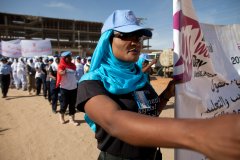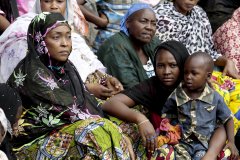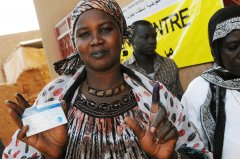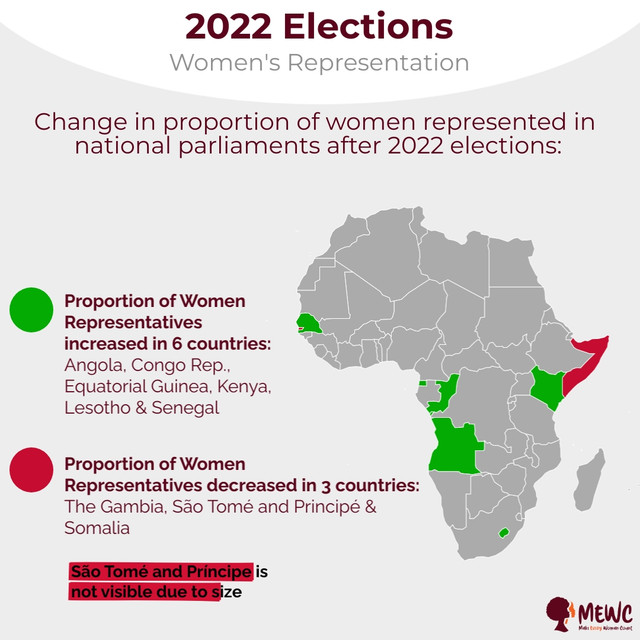Gender Issues Showlist
Women, Peace & Security
UNSCR 1325 calls on all parties to: protect and respect the rights of women and girls in conflict & post-conflict; increase women participation in all conflict resolution, peacekeeping and peace-building & to end impunity by prosecuting perpetrators of sexual and other violence on women and girls
index.php?option=com_content&view=category&id=56&Itemid=1913
Human Rights of Women
Thirty six years after the adoption of CEDAW, many women and girls still do not have equal opportunities to realize rights recognized by law. Women are denied the right to own property or inherit land. They face social exclusion, “honor killings”, FGM, trafficking, restricted mobility, early marriage,...
index.php?option=com_content&view=category&id=44&Itemid=1908
Violence Against Women
Violence against women is the most shameful human rights violation. Gender based violence not only violates human rights, but also hampers productivity, reduces human capital and undermines economic growth. It is estimated that up to 70 per cent of women experience violence in their lifetime
index.php?option=com_content&view=category&id=69&Itemid=1912
Political Participation & Leadership
Where women are fully represented, societies are more peaceful and stable. Women political participation is fundamental for gender equality and their representation in positions of leadership must be a priority for all Africans governments.
index.php?option=com_content&view=category&id=65&Itemid=1911
Latest News
- COTE D'IVOIRE: South-South Meeting to Promote Gender Equality and Combat Deforestation
- RWANDA: Rwanda Set to Launch Cervical Cancer Elimination Plan
- NIGERIA: Over 5,000 Nigerian Women Stranded in Iraq - Govt
- SUDAN: Healthcare Collapse Threatens Pregnant Women in Sudan's Sharg El Nil
- GHANA: President Nominates 12 More Ministers
- Senegal: Parliamentary election 2024
- Mauritius: Parliamentary election 2024
- Ghana: Presidential and Parliamentary Elections
- Botswana: Parliamentary elections 2024
- Algeria: Presidential Election 2024
GHANA: OAFLA Extends Free Reproductive Health Services to Ashanti Region
Source: GBC Ghana
The Ghana Chapter of the Organization of African First Ladies against HIV/AIDS, OAFLA, has extended its free reproductive health services to the Ashanti region with the objective of reducing maternal and child mortality rates which mostly results from breast and cervical cancers, hepatitis as well mother-to-child transmission of HIV.
The organization in collaboration with the Ghana AIDS Commission and other stakeholders in the health sector have resolved to replicate its services including free health screening and tests for various diseases and community health outreaches in particularly rural Ashanti.
Five Regions including Greater Accra, Eastern, Western, Central and Brong-Ahafo have so far benefited from this collaboration.
The First Lady, Dr. Mrs. Lordina Mahama who is also the current President of OAFLA made these known at a community advocacy durbar at Asante Mampong, under the theme; "Preventing Mother-To-Child Transmission of HIV and Keeping Mothers Alive".
Radio Ghana's Reporter, Enoch Kofi Saarkwah reports that the durbar which brought together Chiefs and queens from various traditional councils as well students, health directors and officials in the Ashanti region was interspersed with a number of free screenings and tests as well as counseling sessions.
In her address, the first lady, Dr. Mrs. Lordina Mahama noted that the quest to build a prosperous nation cannot be fully realized without the role of women, who constitute a greater percentage of the country's population.
This according to her, places a huge responsibility on particularly stakeholders in the health sector, as well as all groups interested in women and children's affairs to complement efforts geared towards their well-being, through periodic public education on disease prevention as well as offering them material and emotional support where necessary.
She reiterated the need for families to check their HIV statuses to know whether they carry the virus or otherwise, whilst appealing to the public to desist from stigmatizing carriers of the virus.
The Director General of the Ghana AIDS Commission, Dr. Angela El-Adas said although the Commission in the last five years has been able to reduce the spread of the deadly virus by 50 per cent, while increasing treatment to over eighty thousand carriers over the same period, there is still more work to be done.
The focus, Dr. El-Adas emphasized should now be on how to utilize modern test and treatment practices to further reduce the spread of the virus especially from mothers to their unborn children.
The Mamponghemaa, Nana Agyakuma Dufie commended the First Lady for demonstrating exemplary leadership in the fight against sexually transmitted diseases and other social problems that derail the progress of women and children, while urging traditional authorities particularly her colleague queen mothers to do same in their respective communities.





